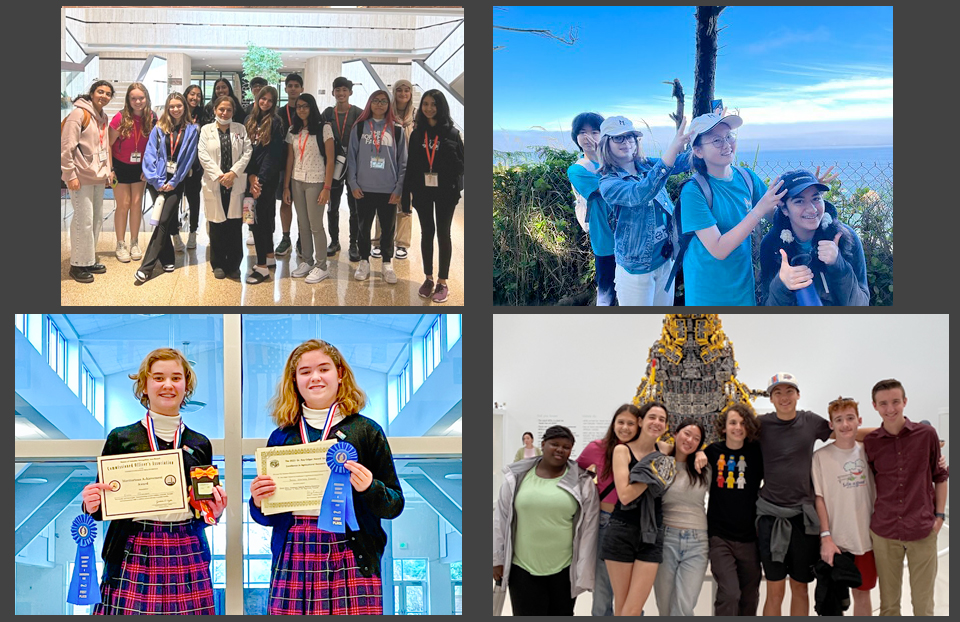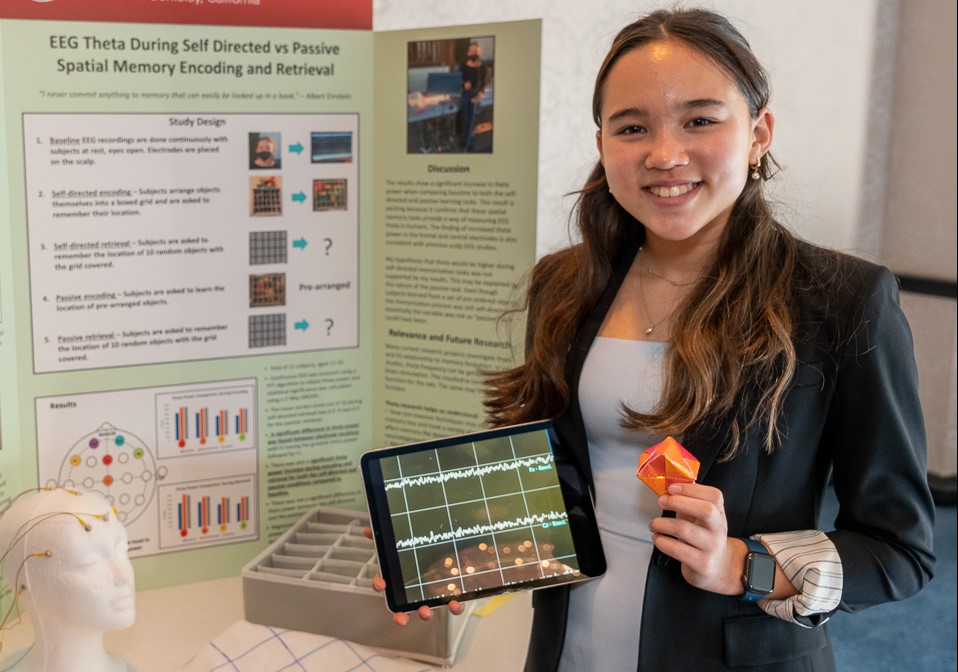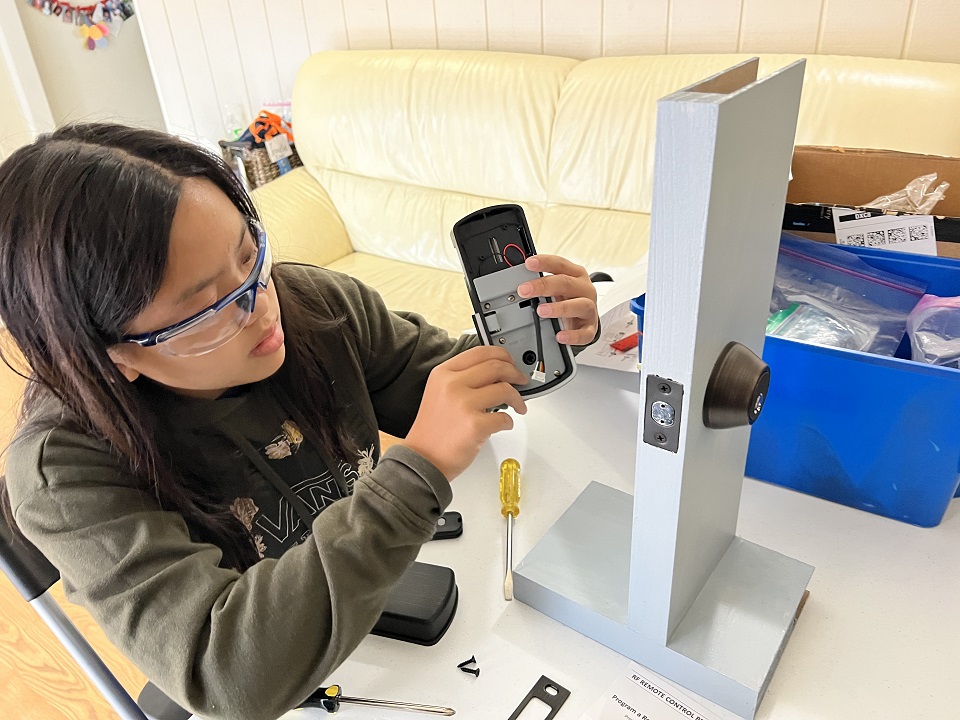Five Questions with Charlotte Lenore Simon Michaluk, winner of the $10,000 DoD STEM Talent Award
If climate action and the conservation of forests and wildlife gets you excited, you’ve got something in common with 14-year old high school freshman, Charlotte Lenore Simon Michaluk, from Pennington, New Jersey. This past fall, Charlotte won the $10,000 DoD STEM Talent Award in the Broadcom MASTERS, for her demonstration of STEM, leadership and technical skills as well as her promise as a scientist who would improve the community around her.
As a PADI certified dry suit scuba diver and environmental activist, Charlotte has seen firsthand how aquatic animals, such as sharks, naturally avoid biofouling — this is the accumulation of plants, barnacles, algae or other small living creatures on wet surfaces. Biofouling has many detrimental effects on the environment including increased fuel use and carbon emissions. Scrubbing species off ship hulls and pipes can be expensive and some chemicals used to do the job have been toxic, leading to terrible outcomes and deformities in marine life.
Though sharks are feared for good reason, engineers and scientists have taken special notice of their slick skin. While one would think their skin is smooth, it’s actually due to tooth-like scales called denticles that sharks are able to swim fast, evade biofouling on their bodies and reduce energy expended. For these reasons, in her winning science project, Charlotte mimicked the shark skin of a few different shark species with 3D modeling. She designed and tested a myriad of hull coatings to reduce drag and the adhesion of barnacles and other organisms. She ultimately found that Mako shark skin denticles holds the most potential saying, “This coating helps to slow climate change and invasive species transport by decreasing frictional drag between ship hulls and water, which reduces cargo ship fuel consumption.”
When she isn’t working to eliminate climate change, Charlotte teaches conservation topics to adults and children at festivals and nature centers in three states. As a result of this work and her involvement in a land conservation project to protect an old hardwood forest, she’s even been invited to a meeting with a US Congressman!
Let’s hear more from Charlotte below!
Which sci-fi advancement do you wish we had by now?
In the movie Avatar, the Naʼvi connect directly to other creatures and the natural world through a neural interface. The era of the SARS-CoV-2 pandemic highlights how significantly the interplay between ecosystems on our planet drives our human story, and is a reminder of how strongly microbiology has shaped human history. It is probable that this virus evolved in a bat. Our response vaccine development is aided by a compound found in deep sea sharks. Perhaps, one day, our level of microbiological and ecological understanding will allow us to shape threatening viruses before they leave an indelible mark of suffering on society.
What would you invent if you had all the resources in the world?
I would invent clean desalination to bring drinking water to the world’s most vulnerable populations. A surprising number of people lack clean drinking water. Desalination plants convert seawater into freshwater, however they are energy intensive and polluting. With unlimited resources, I would invest in clean desalination technologies such as nano-scale graphene filters that could extract drinking water from both seawater and also economically extract the metal salts of sodium, magnesium, lithium, calcium and potassium to limit the impact of surface mining.
What would you say in order to inspire the next generation of scientists?
I advise young people to dig deep into whatever they find interesting and compelling, then approach the area as a scientist and an engineer. For me, the word “science” and the title “scientist” speak to the process to learn about the workings of the world we live in. The exciting thing about this process is that it is highly collaborative, and never finished. This means, to me, that there is no limit to the contributions one might make to advance understanding. The inspiring notion one can take from this is that every investigation one might undertake can lead to furthering understanding of our world.
Today’s middle and high school STEM students will have careers in the future that do not yet exist. I think that as a society, we need to remind young people that they do not need to mold themselves to a job description or technical culture of the past. They will naturally be creating new careers for the future. For example, the title “Data Scientist” did not exist when many of the 2020 Broadcom MASTERS finalists were born, and currently there is a shortage of people with data science skills.
Given that the Broadcom MASTERS went virtual this year, what about your experience surprised you the most?
It is remarkable to me how well-designed and well-deployed technology was able to virtually melt the barrier of space between participants in this wonderful event. It was completely immersive. I felt as if we were all in one physical space. I was especially surprised at the collaborative nature of the coding exercises, and how my team was able to bring our individual experiences together to program something that we would not have created individually, all through a virtual interface.
What was your most favorite or memorable experience from virtual Broadcom MASTERS? And why?
I am absolutely ecstatic to be honored with the DoD STEM Talent Award. Being recognized with this award has made me feel like my dreams are so much more tangible. So many amazing technologies that touch our lives every day started with DoD STEM research and innovation.
One of my favorite parts of the Broadcom MASTERS was discussing my research with the judges. They all had such interesting backgrounds and insights! I also loved meeting everyone from around the country. The challenges were all so fun and interesting. I enjoyed all of the activities such as the dance breaks and paint night.
When I returned to school, it became even more clear how transformative the Broadcom MASTERS experience was. During the actual week, while immersed in the experience, I did not notice how much I was changing until I was put back into my original situation and then realized how much I had grown. I felt like I had been lifted up and set down a mile ahead, with new skills and awareness.


